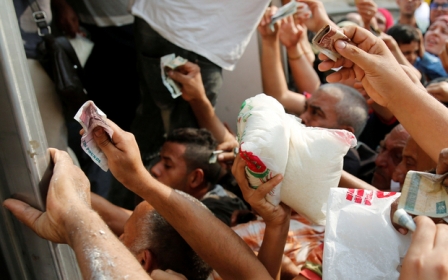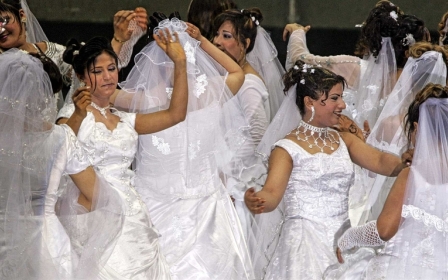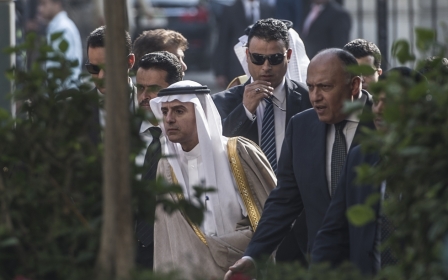Cairo locked down: Streets empty as weary Egyptians shun protest call
Egyptian police quashed a few small protests across the country on Friday and arrested dozens of protesters as calls for an uprising against poverty went largely unheeded.
Police rounded up at least 130 protesters across the country, a security official said.
Riot police and armoured vehicles filled the otherwise empty streets of central Cairo early on Friday as security forces built up a heavy presence in anticipation of popular protests over deteriorating economic conditions.
READ: 11/11 in Egypt: The invisible demonstrations
A little-known group calling itself Movement of the Poor had called for Egyptians to protest on 11 November against deepening austerity.
In Cairo, where police had deployed in force in anticipation of protests, 39 alleged demonstrators were arrested.
Police also quickly scattered several dozen protesters who assembled in the port city of Suez.
The calls had been made since August, but gained traction on social media only last week after Egypt raised fuel prices and floated its currency, moves welcomed by bankers but bemoaned by ordinary people as the latest blow to their diminishing spending power in a country that relies on imports.
Tahrir Square was empty save for armoured vehicles equipped with tear gas canister launchers, dozens of riot police and high-ranking officers. Authorities shut down the Sadat metro station to prevent demonstrators reaching the square, famed for its political protests.
There was a similarly heavy security presence in other areas of Cairo, including the Shubra district, and other major cities across the country including Alexandria, Suez, and Minya.
The protest call, backed by the outlawed Muslim Brotherhood, went largely unheeded and led to many Egyptians mocking the situation on social media.
Translation: “Well, 11/11 turned out to be easy! So what were they on about saying there would be a coup against me and you’ll be removed and there will be a popular revolution and stuff!”
But in a country where street politics helped to unseat two presidents within two years, authorities are taking no chances. Dozens of people were detained in recent weeks for allegedly inciting unrest.
In the run-up to Friday, the interior ministry announced the arrests of alleged Brotherhood members planning violence on the day.
Unlicensed protests have been banned in Egypt since the military overthrew Islamist president Mohamed Morsi in 2013 and cracked down on his followers.
A crackdown by security forces on pro-Morsi protesters in the following months killed hundreds and jailed thousands.
Meanwhile, a militant insurgency has killed hundreds of policemen and soldiers, and also targeted tourists, further battering the country's economy.
When Egyptians took to the streets again in mid-2013 to end a year of Brotherhood rule, they looked to general-turned-president Abdel Fattah al-Sisi to restore stability.
However, many ordinary Egyptians and activists say the heyday of street politics is over. After taking power, Sisi quickly crushed dissent and has applied a protest law so strictly that few dare to come out, in spite of increasing public anger.
In recent weeks, the president has urged Egyptians not to protest and warned that there will be no going back on economic reforms, no matter how much pain they might cause.
State media reported that police were surrounding the entrances of Cairo and other cities to ensure that members of the Brotherhood did not sneak in.
Translation: "Fire two more tear gas canisters, or what do you think? – Against who, there isn’t anybody!”
"Police have surrounded the entrances of Cairo, Giza, and Qalyubiya to prevent the terrorist group's elements from sneaking into any potential demonstrations heeding these dubious calls and creating chaos," the state news agency said.
The interior ministry said on Thursday that it had confiscated a cache of arms and ammunition hidden in a graveyard and house by the Brotherhood in Fayoum province, southwest of Cairo.
It also said it had raided five bomb factories around the country on Wednesday, accusing a militant group of coordinating with the Brotherhood to attack police checkpoints on the eve of the protests.
Staying at home
Stung by street revolts that have made life worse rather than better, many people said they would stay home.
Sisi came to power promising economic reform and stability, but problems have piled up. With a budget deficit of 12 percent, a collapse in tourism and a burgeoning currency crisis, Egypt reached a preliminary deal with the International Monetary Fund in August for a $12bn loan to support its reforms.
Yet Egyptians feel clobbered by tax increases, soaring food-price inflation and cuts in state subsidies, which the government says can no longer be postponed.
Core inflation is almost at eight-year-highs, at more than 15 percent, as a foreign exchange shortage and an increase in customs duties bite hard in a country that imports everything from sugar to luxury cars.
Egypt raised electricity prices by 25-40 percent in August and introduced a 13 percent value-added tax approved by parliament in the same month.
Previous governments had been wary of such measures, fearing they could spark unrest.
But many Egyptians are weary after years of tumult in which the country saw two presidents deposed and have little appetite for more protests.
Translation: “I think everyone is waiting for everyone to take to the streets .. well bravo :D”
The government has tried to win public support for the austerity measures with a billboard campaign and media blitz and also has sought to expand social security schemes to shield the poorest from the effects of the rising prices.
But many Egyptians who do not qualify for such schemes complain they can no longer afford meat, while sugar shortages have driven fears of an impending food crisis.
In his speeches, Sisi has sought to persuade Egyptians that a collective sacrifice is necessary to save the country from financial ruin, even urging people to donate spare change, comments that drew online derision.
He also warned that the army may be deployed within six hours in the event of street unrest.
New MEE newsletter: Jerusalem Dispatch
Sign up to get the latest insights and analysis on Israel-Palestine, alongside Turkey Unpacked and other MEE newsletters
Middle East Eye delivers independent and unrivalled coverage and analysis of the Middle East, North Africa and beyond. To learn more about republishing this content and the associated fees, please fill out this form. More about MEE can be found here.




